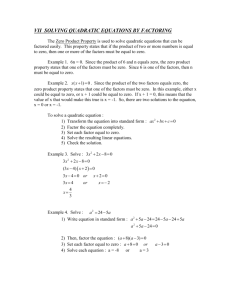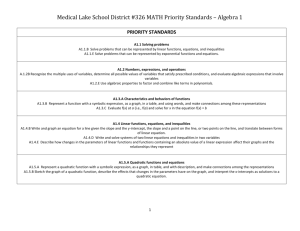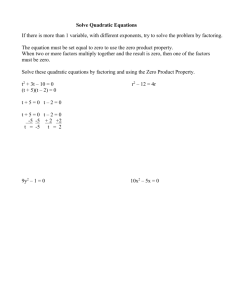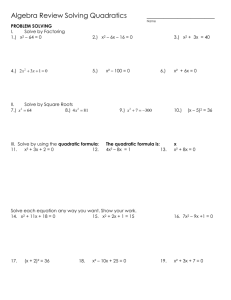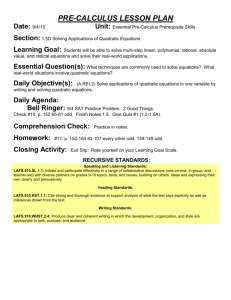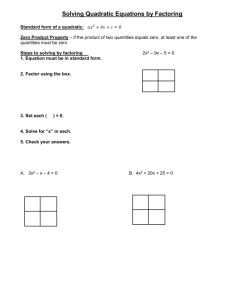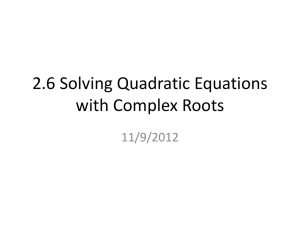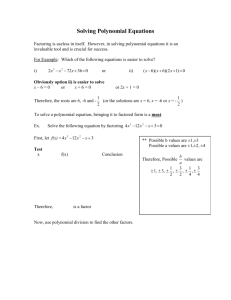Introduction to Algebra II Final Exam Outline – June 2015 The focus
advertisement
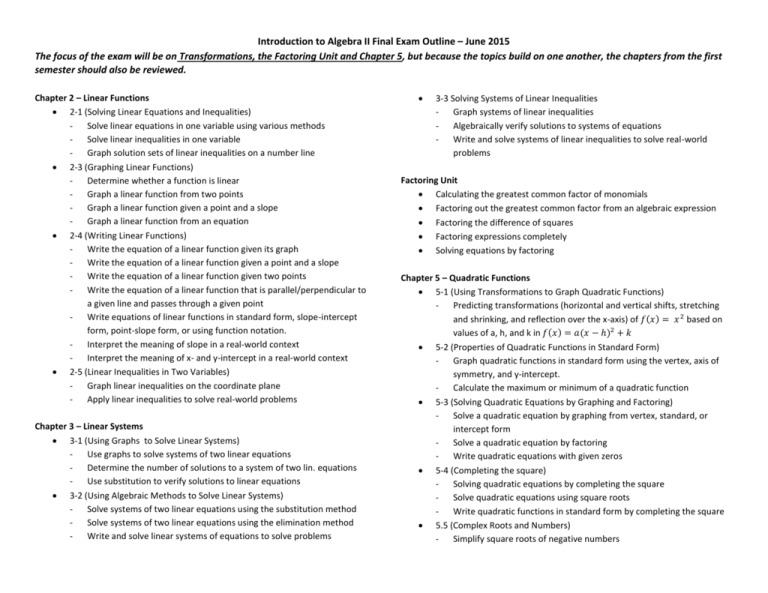
Introduction to Algebra II Final Exam Outline – June 2015 The focus of the exam will be on Transformations, the Factoring Unit and Chapter 5, but because the topics build on one another, the chapters from the first semester should also be reviewed. Chapter 2 – Linear Functions 2-1 (Solving Linear Equations and Inequalities) Solve linear equations in one variable using various methods Solve linear inequalities in one variable Graph solution sets of linear inequalities on a number line 2-3 (Graphing Linear Functions) Determine whether a function is linear Graph a linear function from two points Graph a linear function given a point and a slope Graph a linear function from an equation 2-4 (Writing Linear Functions) Write the equation of a linear function given its graph Write the equation of a linear function given a point and a slope Write the equation of a linear function given two points Write the equation of a linear function that is parallel/perpendicular to a given line and passes through a given point Write equations of linear functions in standard form, slope-intercept form, point-slope form, or using function notation. Interpret the meaning of slope in a real-world context Interpret the meaning of x- and y-intercept in a real-world context 2-5 (Linear Inequalities in Two Variables) Graph linear inequalities on the coordinate plane Apply linear inequalities to solve real-world problems Chapter 3 – Linear Systems 3-1 (Using Graphs to Solve Linear Systems) Use graphs to solve systems of two linear equations Determine the number of solutions to a system of two lin. equations Use substitution to verify solutions to linear equations 3-2 (Using Algebraic Methods to Solve Linear Systems) Solve systems of two linear equations using the substitution method Solve systems of two linear equations using the elimination method Write and solve linear systems of equations to solve problems 3-3 Solving Systems of Linear Inequalities Graph systems of linear inequalities Algebraically verify solutions to systems of equations Write and solve systems of linear inequalities to solve real-world problems Factoring Unit Calculating the greatest common factor of monomials Factoring out the greatest common factor from an algebraic expression Factoring the difference of squares Factoring expressions completely Solving equations by factoring Chapter 5 – Quadratic Functions 5-1 (Using Transformations to Graph Quadratic Functions) Predicting transformations (horizontal and vertical shifts, stretching and shrinking, and reflection over the x-axis) of 𝑓(𝑥) = 𝑥 2 based on values of a, h, and k in 𝑓(𝑥) = 𝑎(𝑥 − ℎ)2 + 𝑘 5-2 (Properties of Quadratic Functions in Standard Form) Graph quadratic functions in standard form using the vertex, axis of symmetry, and y-intercept. Calculate the maximum or minimum of a quadratic function 5-3 (Solving Quadratic Equations by Graphing and Factoring) Solve a quadratic equation by graphing from vertex, standard, or intercept form Solve a quadratic equation by factoring Write quadratic equations with given zeros 5-4 (Completing the square) Solving quadratic equations by completing the square Solve quadratic equations using square roots Write quadratic functions in standard form by completing the square 5.5 (Complex Roots and Numbers) Simplify square roots of negative numbers Use completing the square or square roots to solve quadratic equation with complex roots 5-6 (The Quadratic Formula) Use the discriminant to determine the number and type (real or complex) of solutions to a quadratic equation. Use the quadratic formula to solve quadratic equations with real or complex solutions. 5-7 (Quadratic Inequalities) Graph quadratic inequalities 5-8 (Curve Fitting with Quadratic Models) Write quadratic functions to model given data 5-9 (Operations with Complex Numbers) Add, subtract, multiply, and divide complex numbers Write complex numbers in standard form Graph complex numbers on the complex plane Compute the absolute value of a complex number
